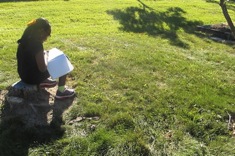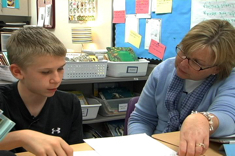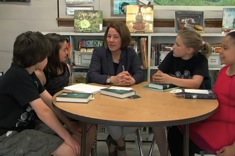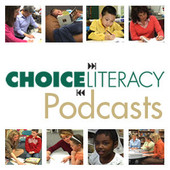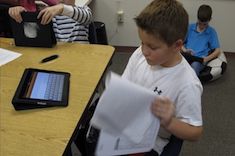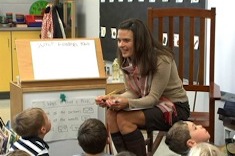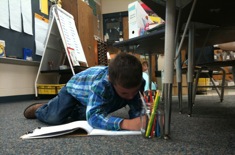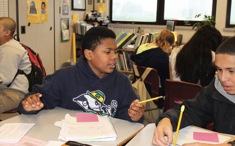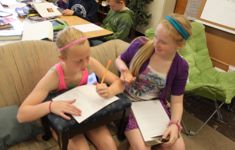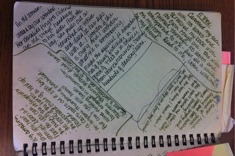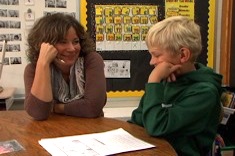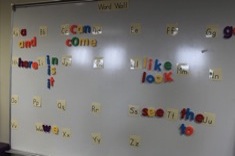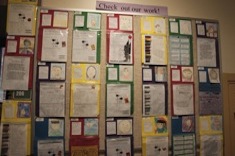Teaching Writing
Everyone who writes for Choice Literacy loves teaching writing, because we all write ourselves. We know it is "hard fun," as Donald Murray famously said—exasperating and exhilarating at the same time. The writing workshops you will read about here and see in our videos are busy, noisy, vibrant places. And most days, we wouldn't want to be anywhere else than in the midst of 'em! Here is where you'll find our latest discoveries, insights, and occasional boneheaded mistakes in teaching writing.
Latest Content
I Don’t Want to Know What You Did Last Summer: Rethinking Narrative Nonfiction
Stella Villalba rethinks the seemingly innocuous “What did you do last summer?” writing assignment at the start of the year, especially for children who may have more limited experiences than peers.
Adding Dialogue to Writing: Conferring with Sam
Karen Terlecky confers with Sam about adding dialogue to writing in her fifth-grade classroom.
Back to Basics: Routines in Writing Workshops
Ruth Ayres considers what's essential in writing workshop routines.
Quick Writing Conferences in Second Grade
In these brief writing conferences with second graders, Sean Moore reinforces an earlier minilesson on using descriptive language.
Provoking Young Readers
Melanie Meehan finds read aloud is a great time for children to connect opinions and experiences.
Crafting Characters and Scenes
In this discussion with fifth graders about her book Paper Things, author Jennifer Richard Jacobson and the students share strategies and tools for visualizing scenes and characters when they are writing stories.
Feed Forward
Carly Ullmer learns a powerful lesson about teaching her middle school students to respond to peer writing.
Digital Literacy Workshop
Maria Caplin has suggestions for making transitions to digital literacy in reading and writing workshops.
We Are All Writers with Louise Borden (PODCAST)
In this podcast, author Louise Borden talks about writing from a historical viewpoint.
Ralph Fletcher on Mentor Texts (PODCAST)
If you’re spending some time sifting through new books and thinking about teaching with them, you’ll enjoy this podcast with Ralph Fletcher.
The Power of Charts in the Classroom
Melanie Swider shares suggestions for making anchor charts more purposeful.
Quick Take: Starting an Anchor Chart in Kindergarten
Mandy Robek begins an anchor chart with her kindergartners and explains the value of shared writing for creating charts about reading strategies and behaviors.
Note Taking for Research
Katherine Sokolowski helps her fifth graders build notetaking skills for research.
Choices for Paragraphs
Melanie Meehan finds third grade is a good age for helping students develop paragraphing skills.
Second-Grade Minilesson on Paragraphs
Ruth Ayres uses a student text to demonstrate the importance of paragraph breaks in this second-grade minilesson.
Celebrating “The Voice” of Writers
Melanie Meehan presents a fun activity for late in the school year that uses the format of The Voice television series.
Shared Writing in Kindergarten
Mandy Robek leads a shared-writing session in kindergarten.
Space to Draft
Ruth Ayres argues against lockstep approaches to the writing process.
Group Composing
Gretchen Schroeder finds group composing is a fun way to build community, writing skills, and understanding of how arguments work with her high school students.
Weekly Check-In Sheets
Are you finding effort from students is flagging? Katherine Sokolowski develops check-in sheets as a way to lift student energy and reflection.
Giving Students a Notebook Tour
Melanie Meehan finds a notebooks tour is a terrific minilesson for helping students expand the ways they use notebooks.
Using a Sketchbook as a Tool to Teach Grammar
Melanie Swider describes how she develops notebook pages for minilessons and conferring.
How Long?
Ruth Ayres provides a ready reference guide for the typical length of everything from a minilesson to a conferring session.
Making Memories Stick: Tutoring Kirk
Max Brand tutors a struggling fourth grader who produces very little writing.
Moving Away from Bed to Bed: Conferring with Ty
Ruth Ayres confers with fourth grader Ty about his personal narrative, and works to move him away from a “bed-to-bed” approach in his writing.
Guiding Principles for Conferring
Melanie Meehan shares what’s essential in conferring.
Raising the Quality of Word Work
Shari Frost has some practical suggestions for more thoughtful word work.
Small-Group Writing: Steps for Success
Cathy Mere provides grouping guidelines for primary teachers.
Going Public with Word Work
Maria Caplin is discouraged at the low level of transfer of new vocabulary in her fifth graders’ writing, so she makes some changes in her classroom.
Science Observations in Kindergarten
Mandy Robek helps her kindergarten students complete science observations.
Browse Content By
Type
Category
- Assessment Tools
- Big Fresh Archives
- Booklists
- Choice Numeracy
- Classroom Design
- Common Core
- Community Building
- Conferring
- Content Literacy
- Digital Literacy
- English Language Learners
- Equity
- Family Relations
- Free Samples
- Guiding Groups
- Leadership
- Literacy Coaches
- Mentor Texts
- Minilessons
- New Teacher Mentors
- Podcasts
- Poetry
- Quote Collections
- Reading Strategies
- Self Care
- Struggling and Striving Learners
- Talking and Listening
- Teacher Study Groups
- Teaching Reading
- Teaching Writing
- Word Study and Vocabulary
Author
- Melissa Quimby
- Nawal Qarooni
- Gwen Blumberg
- Julie Cox
- The Lead Learners
- Hannah Tills
- Josie Stewart
- Ruth Metcalfe
- Mallory Messenger
- Becca Burk
- Jodie Bailey
- Vivian Chen
- Mary Brower
- Tiffany Abbott Fuller
- Stephanie Affinito
- Ruth Ayres
- Leigh Anne Eck
- Heather Fisher
- Shari Frost
- Julie Johnson
- Suzy Kaback
- Gigi McAllister
- Shirl McPhillips
- Melanie Meehan
- Cathy Mere
- Debbie Miller
- Tara Barnett and Kate Mills
- Tammy Mulligan
- Dana Murphy
- Bitsy Parks
- David Pittman
- Brenda Power
- Heather Rader
- Matt Renwick
- Mandy Robek
- Christy Rush-Levine
- Gretchen Schroeder
- Jen Schwanke
- Brian Sepe
- Katherine Sokolowski
- Stella Villalba
- Jennifer Vincent
Grade Level
Choice Literacy Membership
Articles
Get full access to all Choice Literacy article content
Videos
Get full access to all Choice Literacy video content
Courses
Access Choice Literacy course curriculum and training

